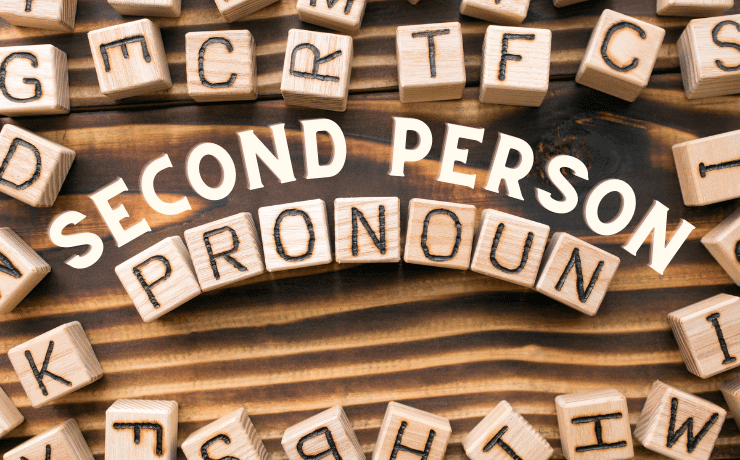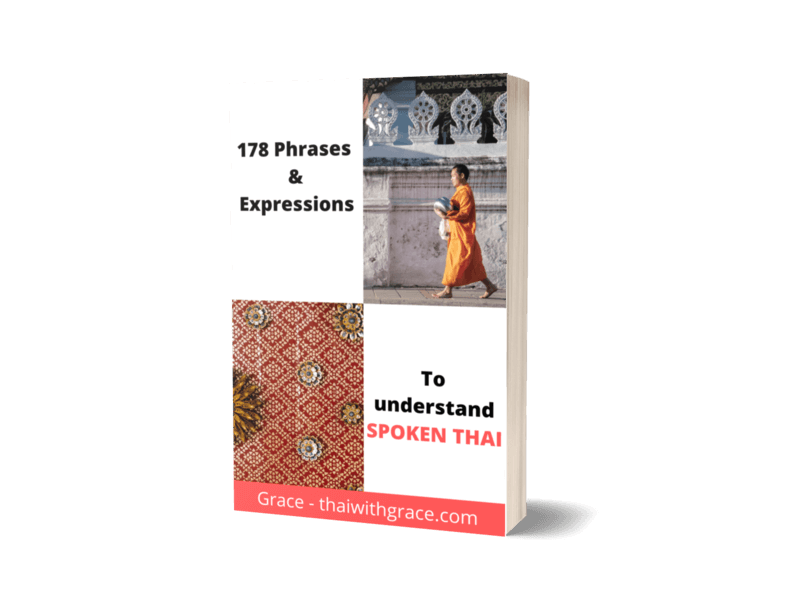If you have studied Thai, then you know that คุณ (kun) means “you“. But did you know there are other ways to say “You” in Thai that will make you sound more like a native?
In this article, I will cover the second person pronouns “you” in Thai.
- คุณ (Kun)
- Using only Name to say "You".
- Kun + family term
- Using ท่าน tân to say "You" in Thai
- Using หนู nŏo to say "You" in Thai
- Using นาย naai to say "You" in Thai
- Using แก Gae to say "You" in Thai
- Using (หล่อน) lòn to say "You" in Thai
- Using ตัว (Tua) to say "You" in Thai
- Using เธอ (ter) to say "You" in Thai
- Using มึง (Meung) to say "You" in Thai
- Tips
Check out the video version of this article above and download the transcript of the video here.
คุณ (Kun)
Let’s start with the word you all probably already know.
Kun is the default word for “YOU”. It is a polite word but depending on how you use it; it can be harsh as well.
You can use it with strangers, coworkers, or someone you want to keep a distance with. When a person uses this word with me, I feel like they want to respect me but also don’t want to get too close to me.
I often see bosses or managers call their subordinates “kun” even when scolding them.
Examples:
- ทำไมคุณมาสาย
tam-mai kun maa săai
Why are you late? (manager speaking) - ผมส่งอีเมลให้คุณแล้วนะ
pŏm sòng email hâi kun láew ná
I sent you the email
(between coworkers) - คุณไม่มีสมองหรือยังไง
kun mâi mee sà-mŏng rĕu yang ngai (Boss speaking)
What? Don’t you have a brain?
Using “kun” to scold someone is like an educated way of doing it.
To talk to people with more authority than you, you can’t use “Kun”. It’s better to use “Kun” with their title such as ครู kroo (teacher), หมอ mŏr (doctor), ผู้จัดการ pôo jàt gaan (manager), or even “Kun” + name.
If you want to feel less distant but still want to keep the politeness, you can use the word KUN before other words: such as
Kun + name
This is a very common way of saying ‘YOU’ because, as I said, it feels less distant than just “KUN”. I usually use this with my students because I want to be polite to my students. At the workplace, I use it with people in other departments that I have to be polite to.
Example:
Khun apinyaka, Khun Rob.

Using only Name to say “You”.
If you cut out Kun and use only the person’s name, you will also cut out the politeness. It’s going to have a neutral, friendly feeling. I call all friends of the same age by their name. At university, school classmates call each other by their name when saying “you”.
Using the person’s name is one of the most common ways to say “YOU” in Thai.
Example:
- วันนี้เคนจะทำอะไร
wan née ken jà tam à-rai.
What are Ken (you) doing today? - พรุ่งนี้โมว่างไม่
prûng-née moh wâang mâi
Are (Moh) you free tomorrow?
Kun + family term
Family terms can be used as “You”, even if you are not actually related. Family terms such as: dad พ่อ (pôr), mom แม่ (mâe), uncle ลุง (lung), Aunt ป้า (bpâa), Aunt น้า (náa), Aunt อา (aa), Older sibling พี่ (pêe), Younger sibling น้อง (nóng), Grandpa ปู่ (bpòo), Grandma ย่า (yâa), Grandma ตา (dtaa), Grandma ยาย (yaai).
To make it politer, you can add “kun” in front of some of them.
As I mentioned, even though they are not connected to you by blood, you can use these family terms with someone that you know. This makes it sound more natural in a casual setting. There are many cases that you can call a total stranger with these family terms as well. Let me give you my example:
- I call my friend’s parent “Dad” (คุณพ่อ kun pôr) and “Mom” (คุณแม่ kun mâe).
- I call my parents’ friends uncle, aunt, grandma, etc.
- A senior in my university would always be พี่ (pêe) (never khun) and a junior in my university would น้อง (nóng)
- It’s very normal to call motorbike taxi drivers, taxi drivers, sellers in a market “pee, lung, pa, na, aa”. Even if they look more like a pa, or lung than a pee, I would call them “pee” just to make sure it’s not rude. Because, Thai people don’t like to accept that they are already old 😂😂. So I would recommend calling people that look a lot older than you “pee”. To be more polite You can say Khun lung, khun pa, khun na, khun ar, but not khun pee. Khun pee is outdated and not used these days.
I will tell you one rare case that happened to me. I had a neighbor, probably in his 50s. I moved to a house nearby his house. Not long after, I called him “khun lung” and he responded, “I’m not your uncle, I’m a university teacher, call me teacher”. I felt so embarrassed. This older man wants to keep a distance and doesn’t like me. That’s was my impression. He was the exception, and I stopped talking to him.
I’m telling you this story, so you know that using family terms can be risky (but rarely) because you are acting like you are close to the person when they might feel the opposite.
So if it seems that everyone in Thailand is called by aunt, uncle, grandma, it’s because of this, lol.
Check out my article about Family terms in Thai to learn about all the family terms here:
Using ท่าน tân to say “You” in Thai
tân is extremely formal. With this word, you are raising the level of the person you are talking to very high.
When I hear the word tân being used, I feel like that person being called has a very high status. Maybe a prime minister, maybe a high-ranking military leader, a respected owner or CEO of a big company.
In everyday life, I don’t use this word because it’s too formal.
Example:
- ขอเชิญท่านมาเปิดพิธี
kŏr chern tân maa bpèrt pí-tee
I would like to invite you to do the opening ceremony.
Using หนู nŏo to say “You” in Thai
nŏo means mouse 🐭, but it can be “I” and also “You”.
You can use this to a lot younger than you. Now, I’m 29 years old. I imagine the person that calls me “nŏo” to have white hair, old, maybe 70-100 years old.
40,50 years old man calling me “nŏo“is a bit rude. Inside I’ll be like, “hey, I’m not a kid”.
I can say nŏo to someone probably at most 14 years old.
Using นาย naai to say “You” in Thai
นาย (naai) means Mr, but it can be used as “You”.
I have only seen women use this with guy friends. It has a friendly air.
Example:
- เมื่อวานนายโทรหาเราทำไม
mêuua waan naai toh hăa rao tam-mai
Why did you call me yesterday?
Using แก Gae to say “You” in Thai
Gae: if a man uses this, there’s a big possibility that it’s a gay guy. I have not heard a straight man say Gae.
Women use this word with friends of both sex as well. I have a friend that calls me gae. Especially, Thai women that are from women-only school like to use this word to call other people. I don’t know why.
Example:
- เฮ้ย แก เราคบพี่เต้หรือพี่ท็อปดี แกช่วยเราเลือกหน่อยสิ
hóiie · gae · rao kóp pêe dtây rĕu pêe tóp dee · gae chûuay rao lêuuak nòi sì
Hey, you, should I date tai or top. Help me choose!
Using (หล่อน) lòn to say “You” in Thai
This word is often used by the LGBTQ community.
Using ตัว (Tua) to say “You” in Thai
This word is used between friends of similar age of the same generation. Don’t use it with younger or older people. Mostly women use this word because if men use it, it sounds feminine.
Using เธอ (ter) to say “You” in Thai
Older people can use this with younger people. It’s not impolite, but it’s not loving either. Instead, using nŏo or using the name is more caring and loving.
For example, my Thai teacher at school uses (pûuak ter) for you.
Between good friends, men and women can use this word to call each other. This is very friendly. You shouldn’t use this word with people that you are not close to.
Using มึง (Meung) to say “You” in Thai
Really good friends like to use this word between themselves. Both men and women can use this word. If you watch Netflix, all the youngsters at school or university use this word. I have a friend that calls me Meung sometimes as well.
You can’t use this word with people you are not close to or with older people. This would be considered very rude, and you might get into a fight.
I see older people in a family talk to their nephews like this as well. My uncle and his wife use this word with their daughters and nephews.
I remember when I was in grade 3, a male teacher used this with my male classmates. I prefer my teacher calling หนู nŏo or by my name. For me, it’s rude for older people to call me with Meung.
I will tell you a funny story, when my sister was 15 years old, and I was 11. One time, my sister got angry and switched the pronoun from just calling me by my name to “meung”. I cried and ran to tell on my mom. And I think she got punished for using that pronoun with her younger sister.
Typically, people who use meung to say you, will use กู (Goo) to call themselves.
Tips
Hiding the pronoun is the best way
Hiding the pronoun is probably the best way out if you don’t know which pronoun to use. Thai people very often omit the pronoun. This is very natural, so you have to learn to do this. Let me give you an example.
Ex:
- วันนี้จะไปไหนไหม
wan née jà bpai năi măi
Are (you) going somewhere today? - ช่วยถือกระเป๋าหน่อยได้ไหมคะ
chûuay tĕu grà-bpăo nòi dâai măi ká
Can (you) help me carry the bag, please? - จะเปิดร้านกี่โมงคะ
jà bpèrt ráan gèe mohng ká
What time are (you) opening the shop? - เคยไปประเทศเกาหลีไหม
koiie bpai bprà-têt gao-lĕe măi
Have (you) ever been to Korea?
Say “You guys” by adding พวก (pûuak) before the pronoun
If you want to say like “you guys”, you can add ‘pûuak‘ before the pronoun. i.e พวกคุณ (pûuak kun), พวกเธอ (pûuak ter), พวกพี่ (pûuak pêe).
Examples of situations so you know which You to use in Thai
My recommendations for saying “YOU”.
– I recommend you to use พี่ (pêe) in a casual situation with motorbike taxi guy, Uber guy, Fruit lady in a market, etc.
– If that person looks like a highschool student and it’s obvious that you are a lot older, you can use น้อง (nóng)
– If that person is a small kid (3-13), you can use หนู (nŏo).
– With friends, you can copy what your friends call you. Just go along with the group.
– When it’s a formal situation at work or with someone that you need to keep distance, you can use คุณ (Kun) or Kun+name
I hope you learned how to say the Second person pronouns in Thai (AKA all the different ways to say “You” in the Thai language).
Read my article on how to say “I” in Thai here:
Read my article on how to say “he”, “she”, “it” in Thai here:

